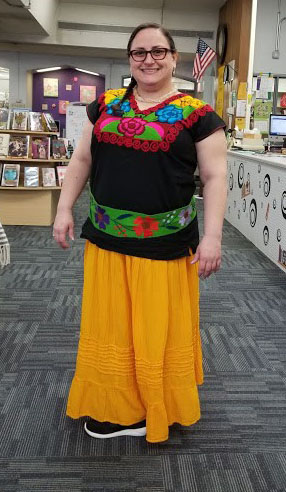
Editor’s note: Reprinted from the February 2021 issue of GCU Magazine. To read the digital version, click here.
By Mike Kilen
GCU Magazine
Jeanne Sanchez experienced every bit of what was wrong with 2020. The death of family and friends from COVID-19. Riots just a half-mile from her home in Kenosha, Wisconsin. Switching to online instruction for her frayed students, who also had to work to support their families in an economy spiraling downward.
“I’m sitting there crying and praying,” said Sanchez, who at the same time was studying for a master’s in Special Education from Grand Canyon University. “What is going on here?”

After all she’d endured, Sanchez wrote an email to her GCU teacher.
“You understood where I was coming from,” she wrote to her College of Education Associate Professor, Dr. Kimber Underdown. “Thank you for being a kind, caring teacher.”
It was all Sanchez could do to recount the toll of the past 10 months.
The disappointment on the face of a student with cerebral palsy. She had watched him practice daily his walk across the stage at Waukegan High School, only to hear the news that in-person graduation was canceled because of COVID-19.
The sorrow in May when her boyfriend died of kidney failure, a complication of his diabetes. Only four other people could join her at his funeral because of the pandemic. “We had been friends forever. I always loved him,” she said. “We had a promise to each other. We would get engaged when we turned 45.”
The confusion in August when Jacob Blake, a Black man, was shot seven times in the back during an altercation with police, which caused days of protests and rioting in downtown Kenosha. The helicopters, yelling and sirens that she could hear from her house lasted into the night. Her afternoons were filled with scrubbing away graffiti downtown, a prized place where she often dines and volunteers for the community theatre, farmers’ market and art gallery.
The fresh hurt from the deaths of her friend from the farmers’ market in September and her step-grandmother in November, both from complications of COVID-19.
“Here I am, dealing with everything going on around me, and still teaching,” said Sanchez, who has been a teacher for 20 years, specializing in working with English as a Second Language students, those with special needs and the poor.
“I try to keep a close eye on the kids. They are working to help support their families – they tell me, ‘I am the only one working’ – so I have to be flexible,” she said.
Through it all, including the death of two other friends from cancer, Sanchez studied for her graduate degree in the evenings. She eagerly opened a weekly video post from Underdown, who knew that during this rough time she needed to find new ways to connect with students.
“I tell them what is going on in my life, or I offer them grace,” she said.
Underdown shared her struggles – she was working full-time from home while keeping a 12-year-old on track with his studies. She realized her own students were doing the same, maybe with one device at home to share.
“I’m not some perfect person sitting in an ivory tower and nothing is touching me,” she said. “Those weekly videos help a lot. They realize I am a human being going though struggles like everyone else.”
She offered leniency on late assignments. She listened.
Sanchez said she would have dropped out without Underdown’s understanding and the support of four fellow GCU students who shared text messages through the long nights. Instead, she earned straight A’s.
She needed to write Underdown a letter, sharing that she realized the importance of Maslow’s hierarchy of needs.
If you are teacher, Underdown said of the hierarchy, you need to meet students’ social, emotional and physiological needs before addressing their intellectual ones.
“They are students, but they are people first,” Underdown said.
It all made sense to Sanchez, even with grief hammering her. “If you don’t know your students’ basic needs and your own needs, how do you teach?” she asked.
If you don’t share what’s happening around you, they can’t relate.
“I think of all the kids I’ve known,” she said. “What kind of world are we leaving them?”
As a Latina from a family of mixed races, she talked with her students about social justice issues playing out in the streets outside their homes. She talked with them about acceptance of each other, “about being a good person and loving each other.”
“I want to make sure no one is suffering needlessly,” Sanchez said. “I listen to them.”
She passed on her strength through her own trials, just as Underdown had.
“I give myself allowance to breathe and relax. I allow my students to do that,” she said. “I let them know they are resilient. They will get through this. We have each other.”
That is why she wrote to Underdown, who reminded her of what is important about being a teacher.
Sanchez keeps another letter posted at her desk.
This one came from her own student and reads:
“Thanks for helping me through everything.”
Grand Canyon University senior writer Mike Kilen can be reached at [email protected] or at 602-639-6764.
****
Related content:
GCU Today: GCU Magazine finds the good cheer in innovations
GCU Magazine: His doctoral degree was a tough act to follow
GCU Magazine: COVID-19 couldn't stop GCU's mission in community
GCU Magazine: My LopeLife: Class of 2020 has powerful perspective



































































